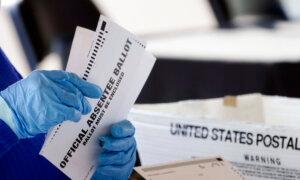A U.S. district judge said the dating requirement violates voters’ constitutional rights without improving election security.
A federal judge has ruled that Pennsylvania’s requirement for voters to date the outer envelope of their mail-in ballots is unconstitutional.
In a March 31 decision, Judge Susan Paradise Baxter of the U.S. District Court for the Western District of Pennsylvania sided with a group of Democratic organizations and an Erie County voter who challenged the law after the 2022 general election.
The judge said the state’s enforcement of the envelope rule violates the First Amendment because it disenfranchises voters without serving a valid governmental purpose.
The case stems from a lawsuit filed in 2022 by two Erie County voters, one of whom later dropped out, along with the campaign of U.S. Sen. John Fetterman (D-Pa.), the Democratic Senatorial Campaign Committee, and the Democratic Congressional Campaign Committee.
AFT Pennsylvania, the state affiliate of the American Federation of Teachers, also became a plaintiff in an amended complaint and was permitted to continue based on its organizational and representational standing.
They sued all 67 county boards of elections after more than 10,000 mail-in ballots were rejected during the 2022 general election for failing to meet the envelope date requirement.
Under Pennsylvania law, voters using mailed ballots must write the date on the outer return envelope, even though the ballot’s timeliness is based on when it’s received by election officials, not when it’s dated.
The plaintiffs argued that disqualifying ballots for a missing or incorrect date violated federal protections under the Civil Rights Act and the U.S. Constitution.
While the court dismissed the Civil Rights Act claim—citing a recent federal appeals court decision that upheld the date rule on those grounds—it found that the requirement failed a constitutional test that weighs voting rights against any legitimate state interest.
Baxter applied a legal test used to evaluate whether a law violates First and Fourteenth Amendment rights, such as voting and political expression, and found the date rule failed to meet that standard.
The judge also wrote that although the date rule places only a “minimal” burden on voters, the state failed to present any evidence that the rule helps prevent fraud or improve election administration.
She noted that the Commonwealth itself did not defend the law in court and that arguments from other defendants, including the Republican National Committee (RNC) and the Berks County Board of Elections, lacked factual support.
“The weight of the burden on the citizen’s right to vote is not counterbalanced by evidence of any governmental interest,” she concluded.
The ruling means that county election officials across Pennsylvania may no longer reject absentee and mail-in ballots solely because they are missing a hand-written date or have the wrong date on the envelope.
The court also narrowed the case’s scope, ruling that plaintiff Bette Eakin, whose ballot was rejected in Erie County, did not have legal standing to challenge boards of elections in other counties. The Democratic organizations were permitted to continue on behalf of their members and missions.
A similar state-level ruling was issued in 2024 by the Pennsylvania Commonwealth Court, but it was later vacated by the Pennsylvania Supreme Court on procedural grounds. The federal ruling now marks the most definitive legal rebuke of the envelope date rule.
Pennsylvania first implemented no-excuse mail-in voting in 2019 under Act 77, which also introduced the envelope date requirement. While the rule remains in state law, this federal decision prohibits its enforcement unless overturned on appeal.
An RNC spokesperson said the RNC will appeal the decision, and Berks County’s attorney, Jeff Bukowski, said he will discuss a possible appeal with the county commissioners, The Associated Press reported.
The Epoch Times has reached out to the RNC for a comment.

 2 months ago
3
2 months ago
3










 English (US) ·
English (US) ·